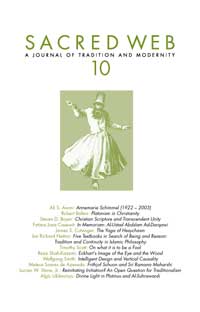Menu:
This article appeared in Sacred Web 10. To order this issue of Sacred Web and other back issues, click here.
Online Articles
In Memoriam: Al-Ustad Abdslam Ad-Darqawi
by Fatima Jane Casewit
The great-great-grandson of Moulay Al-Arabi ad-Darqawi, Al-Ustad Abdslam ad-Darqawi, passed into the next world with the shahadah, the Muslim testimony of faith, on his lips and his right forefinger raised, on 7 May 2002 in his home in Sale, Morocco.
Ustad, or Shaykh, Abdslam as he is sometimes referred to, was born in Taounat, Morocco, in the hills north of Fes in what is called the jbala region of Morocco. His father was Moulay Taib ad-Darqawi, his grandfather was also called Moulay Taib ad-Darqawi, and the latter's father was the great spiritual master and founder of the Darqawi brotherhood or tariqa, Shaykh Al-Arabi ad-Darqawi. His tomb is located in an isolated region in the Bu Barih mountains north of Fes. He is author of Letters of a Sufi Master, translated by Titus Burckhardt and republished in 1998 by Fons Vitae. Within this context, it is to be noted that the spiritual master of the Shaykh Al-Arabi ad-Darqawi was the Shaykh Ali Jamal who died in Fes in 1767 and whose tomb is still a sanctuary and Darqawi zaouwia in the medina of Fes. Shaykh Ali Jamal was a disciple of the Shadhili Shaykh Moulay Al-Arabi Al-Fasi.
Ustad Abdslam ad-Darqawi benefitted from and reflected the best qualities of the traditional educational system in Morocco. His early years were spent in a village mosque where he memorized the Qur’an and learnt to recite according to the rules of tajwid, or "proper" Qur’anic recitation. He studied for six years at the Qaraouine University in Fes and then settled just outside of Bab Sidi Moussa in what was, in the 1930s, the countryside around the old medina of Sale.
Ustad Abdslam was a master of tajwid, which is the perfection of Qur’anic recitation. He taught tajwid in Lycée Lalla Asma' during the 1930s and then at Lycée Nahda in Salé, a girls' school, for many years until his retirement. At the week-ends and when he was not teaching at school, Ustad Abdslam's home was always open to anyone for the study of the Qur’an. Men and women of all ages and from every strata of Moroccan society came to study tajwid and sometimes tafsir, Qur’anic interpretation, by his side. Some would come at regular intervals, others would drop in unannounced. In either case, the Ustad made himself available to teach and encourage the recitation of Qur’an, according to logical, phonological rules of the Arabic language. When these basic principles are applied to the reading of the holy words, the result is a melodious, almost celestial rendering of the scripture.
Ustad ad-Darqawi would never accept any payment for the time he willingly gave to those who sought instruction in his home. He taught until just a few days before his death. His wife and family were, and still are, always welcoming to the constant stream of the faithful desiring to learn tajwid, and later in his life, when he became weaker, to regular visitors.
Ustad Abdslam ad-Darqawi was known for his magnanimous generosity, especially with the limitless time which he gave to his students. He was at once humble and effaced and submitted to God's will. His implacable faith in the Divine Mercy was constant, and was particularly manifest when his beloved eldest daughter, Fatima Zahra, died suddenly at the age of 13. In whatever circumstance Destiny sent his way, the Shahadah or the Divine Name was always on his lips.
In the late 1970s and into the ‘80s, as Morocco saw a number of Muslims from Europe and America arrive for studies in the Rabat area, it was Ustad Abdslam's destiny to become the Qur’anic teacher to students for whom Arabic was not their first or even second language, a task which would remain his even towards the end of his life. To this he brought the sweetness of his nature and the timeless quality of his patience so that none of these foreign students ever left without having learned something more about the recitation of the Holy Book and also about the character of a human being such as the Shaykh whose life both embodied and manifested the ocean of Divine Mercy which is the Qur’an.
In the presence of Ustad ad-Darqawi, one was touched by the baraka or spiritual radiance, of the sacred words of the Qur’an. One was also in the presence of a man who exemplified the comportment the Prophet Mohammed (s.a.w.s.).
Three days before his death, Ustad Abdslam had a vision of Paradise. He told his family that he had had a dream of a verdant, lush valley, the beauty of which he had never experienced on earth. He knew that his meeting with his Lord was nigh as the angel of death delivered the message and privileged him with a vision of two angels.
Ustad Abdslam left an imprint of the Holy Qur’an and true Islamic virtues on all those who came into contact with him. He was one of the "unseen" pillars of the best of Moroccan tradition and culture. He has at last found his deserved abode of peace in Paradise.
In memory and gratitude,
by
Fatima Jane Casewit
with suggestions by Abdurrahman Fitzgerald



